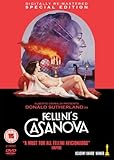Eye For Film >> Movies >> Fellini's Casanova (1976) DVD Review

Fellini's Casanova
Reviewed by: Angus Wolfe Murray
Read Angus Wolfe Murray's film review of Fellini's CasanovaIt is always heartening when a production company makes an effort with a newly released DVD of a 30-year-old film. Usually, the bonus extras are so minimal as to be a complete waste of time, because no one is prepared to spend money on juicing them up.
Not so, these guys. Donald Sutherland is interviewed about his memories of working with Fellini and his experiences on the Casanova set ("It lasted 13 months"). Looking lugubrious in a comfy chair at his home (presumably), wearing what might be described as "English country gentleman casual," he speaks carefully and slowly, as if afraid a silly word might leap out of his mouth and disgrace him in front of the camera.

He tells us that Fellini disliked Casanova and was using him as a metaphor for what he hated about the rich young men in Italy during that period, their shallow fickleness and empty arrogance. "He railed against the destruction of a sensible society."
After Fellini had charmed Sutherland into accepting the role, when he had just finished filming 1900 for Bernardo Bertolucci - Fellini and Bertolucci were fierce rivals - two things happened. Arriving in Rome, having read up about Casanova, with strong views on how he wanted to portray him, the lanky Canadian discovered that the fiery Italian wasn't prepared to listen to a word of it. "He threw my books out of the window."
This Casanova was not going to be historically accurate. "The first five weeks were the worst five weeks of my acting life. Fellini turned into a monster." He never watched his rushes (the previous day's filming), because the film was embedded within. That's where he saw it. "He wanted people to behave like they did in his head, without telling them what was in his head." He shouted. Loudly! He never explained anything. For Sutherland, it was bedlam and insanity. "I remember the noise of it."
And then suddenly something clicked and Fellini smiled. Once he had extracted his ego and flung it away, he became Fellini's tool and would do anything for him. It was like letting go the rope. Now, he has nothing but admiration and praise for the director. He didn't even mind the three-hour make up sessions every morning (four hours for the old Casanova).
This is an excellent interview, despite Sutherland's habit of weighing every word before allowing it out into the public domain.
To announce half way through a humble DVD review that Carmen Piccini's The Magic Of Fellini is the best documentary about a creative artist ever made sounds for all the world like hyperbole. And you may be right. All I can say is that it felt that way, while watching in the late evening, with autumnal winds beating dead leaves against the windowpane and the spirit of Frederico resurrected with affection, exasperation and astonishment on screen.
Anthony Quinn is almost in tears, remembering the experience of making La Strada. He could not speak Italian; Fellini could not speak American. "We communicated with signs and gestures." He wasn't given a script - Fellini started as a writer and yet his attitude towards the written word was typically irrational and arbitrary - and wasn't told what to do. "You had to get into Frederico's brain and find the character there. When you walked onto a Fellini set, you walked into a life." So much of what Sutherland has said about working on Casanova is reiterated throughout this inspirational film.
Claudia Cardinale: "In 81/2, there was no script. It was all improvisation"
Anita Ekberg in the fountain in February for La Dolce Vita: "No script. We write it as we go along. When the camera was rolling, I did what was spontaneous. It was so cold in that water, I couldn't feel my legs. They had to rub alcohol into them."
One of his assistants, talking of the British: "He gave them no script, nor told them what to do, and the actors, being English and so well trained, were too polite to ask."
Speaking of Fellini's habit of making alterations constantly wherever he was and however impractical, she remembers, "He would change the actors' words during editing. One time an actor had his mouth closed and it drove the editor crazy - how can he be speaking? It's not possible! 'Don't worry,' Fellini said. 'He's a ventriloquist.'"
Here was a man who would gladly spend a day looking at hundreds of people to find the right faces, who could not be bothered with technical things, who listened to his dreams, who was once a cartoonist and never lost the ability to draw funny faces, who could not work if it was too quiet. Piccini's film captures the meaning and feel of the creative spirit with her snapshot interviews, snippets from the films, soundbites from the likes of Martin Scorsese ("Great geniuses, like Fellini, are lighthouses guiding us into the harbour"), Woody Allen and Roberto Benigni. It is an extraordinary collage of imagery and reminiscence.
The last word goes to Quinn.
"He came up to me one day and asked, 'How much you cost?" It's embarrassing. I say, 'I get... so much.' He says, 'What?' I say,'...so much.' He says, 'That's as much as the whole picture costs.' I say, 'What can I do?' He says, 'Nothing. I make the picture and then I give it to you. I give you the picture.'"
Quinn is laughing.
Reviewed on: 10 Nov 2005
















